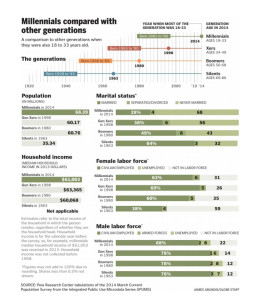Gen Y job candidates are often stereotyped as lacking the soft skills needed for success. What does recent research show?

According to the Center for Labor Markets and Policy at Drexel University in Philadelphia, the average worker today changes jobs 11 times between the ages of 18 and 45, and millennials are likely to make those changes – whether voluntarily or involuntarily – even more frequently. (see Four Retention Strategies Pdf)
In 2014, SkillSurvey Inc. published
findings on the top strengths and weaknesses of millennial job candidates. They examined reference feedback on thousands of job candidates for entry-level positions in a variety of industries, including: nursing, engineering, finance and customer service.
Learning leaders’ workload might be lightened a bit, thanks to research that shows Gen Y isn’t entirely soft skill incompetent.
The research showed that references consistently gave highest ratings to candidates on soft skill values such as trustworthiness, respect for diversity, ethics and integrity.
Ray Bixler, CEO of SkillSurvey, talked to Chief Learning Officer magazine about what these findings mean for learning leaders looking to evaluate and develop younger employees’ soft skills. Edited excerpts follow.
According to your research, which soft skills does Gen Y typically possess, and which ones does it still need?
Contrary to the conventional wisdom that paints millennials as “entitled”, “demanding” or even “lazy” workers, we found that references generally describe entry-level job seekers as eager and dedicated, willing to take responsibility for their actions, dependable and truly focused on doing a good job. So in many ways, this means millennials are fairly strong when it comes to soft skills.
Of course, the data did indicate there are some areas for improvement. The most common include staying up to date with industry trends, the ability to independently make decisions, time management, and presenting information logically and in a compelling way. These are things people usually learn on the job or from experience, so it’s natural that entry-level millennial candidates might be lacking here.
How can employers better evaluate whether millennials they want to hire have or lack these skills?
One of the best ways to evaluate soft skills for entry-level workers is to get as much feedback as possible from people other than the candidate – namely from references. Obviously many entry-level workers will have very little in the way of job references, but there are always college professors and internship supervisors. The key is to get detailed feedback from these references – using things like online reference checking tools – so you are not making a decision in the dark.
Can these skills be developed? If so, how?
Soft skills can be confused with personality traits, which are often innate and can’t really be “taught.” The key is for employers to make sure they are communicating exactly what is expected in a job. For example, hospitals hiring entry-level nurses need to set expectations during onboarding about what it means to provide patient-centric care. Making eye-contact or showing empathy to a patient is just as important as efficiently – and painlessly – hitting the right vein with the needle.
Conversely, if millennial workers find they are being criticized for not showing enough dedication to their work or not taking enough responsibility, they can try to do things to prove their boss wrong. Asking a question about the overall strategic importance of the work they’re doing, volunteering a new idea, or following up on a sidelined project can all go a long way to change a boss’s opinion.
The key for millennials is to make sure they do as much as possible in every position to demonstrate that they possess these soft skills. For many of this generation, today’s employer is tomorrow’s reference. As more and more companies figure out they can get valuable information from references, making a good impression becomes increasingly important.
Source: Chief Learning Officer



